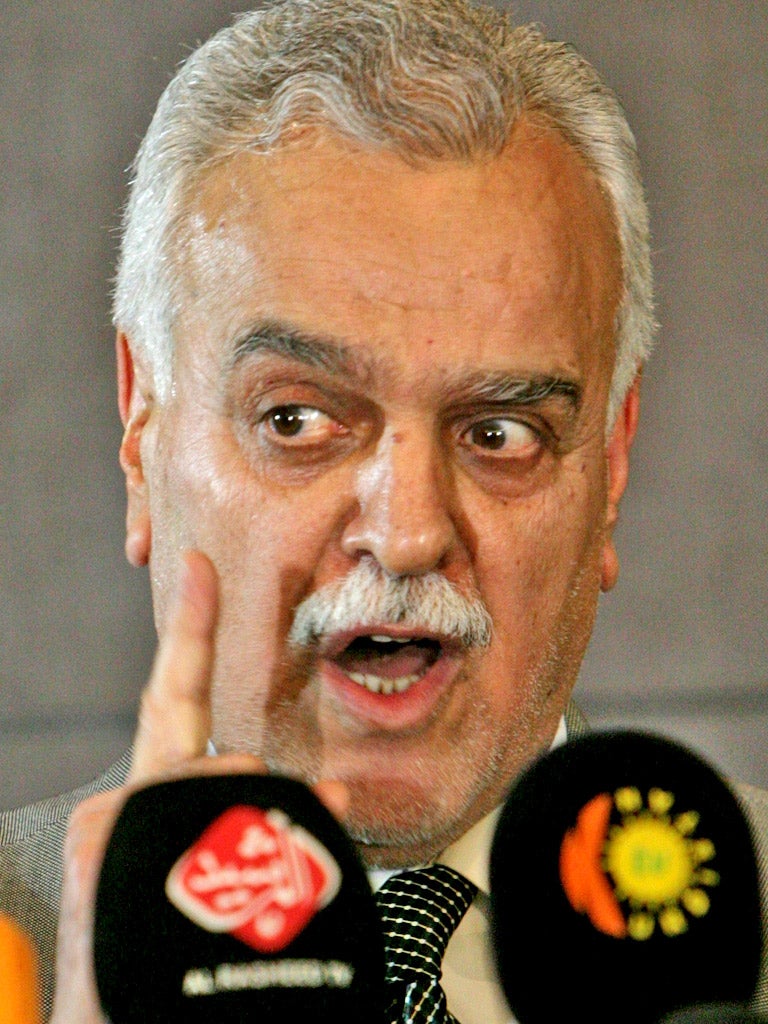Iraqi PM escalates crisis with ultimatum to Kurds
Maliki's demands for handover of rival heighten fears of sectarian strife

Your support helps us to tell the story
From reproductive rights to climate change to Big Tech, The Independent is on the ground when the story is developing. Whether it's investigating the financials of Elon Musk's pro-Trump PAC or producing our latest documentary, 'The A Word', which shines a light on the American women fighting for reproductive rights, we know how important it is to parse out the facts from the messaging.
At such a critical moment in US history, we need reporters on the ground. Your donation allows us to keep sending journalists to speak to both sides of the story.
The Independent is trusted by Americans across the entire political spectrum. And unlike many other quality news outlets, we choose not to lock Americans out of our reporting and analysis with paywalls. We believe quality journalism should be available to everyone, paid for by those who can afford it.
Your support makes all the difference.The Iraqi Prime Minister Nouri al-Maliki has demanded the Kurds hand over his Sunni Vice-President,Tariq al-Hashemi, for whom an arrest warrant has been issued on charges of terrorism.
Mr Maliki said ominously that Mr Hashemi, who has taken refuge in Kurdistan, will receive as fair a trial as that of Saddam Hussein, who was executed in 2006.
Mr Maliki is deliberately escalating the political crisis, which is seen by the Sunni minority as a bid by the Shia-dominated government to marginalise them. The Kurds, who have total political and military control of most of northern Iraq, are likely to refuse to hand over Mr Hashemi and are seeking to act as mediators between him and the Prime Minister.
Mr Hashemi said the accusations against him – that he ran death squads made up of his bodyguards against his opponents – are fabrications. The charges are based on confessions from his guards who said that he personally paid them for attacks, but these allegations may well have been extracted by torture or the threat of it.
Mr Maliki had earlier claimed that an attempt to assassinate him with a remotely detonated bomb three weeks ago outside the parliament building inside the closely guarded Green Zone had been arranged by Mr Hashemi's guards. The details revealed about the alleged plot suggest that, if it was an assassination bid, it was a poorly organised one unlikely to succeed.
In his first comments on the arrest warrant, Mr Maliki said that Iraq is a unitary state and that the Kurds must hand over Mr Hashemi. "I do not allow myself and others to bargain over Iraqi blood," he said. "If they will not hand him over or let him flee or escape, this will lead to problems."
Mr Maliki leads what is nominally a power-sharing government set up exactly a year ago under US pressure in which Shia, Kurds and Sunni all have positions. But the government has always remained divided. Mr Maliki has concentrated power on his own office and is acting as the Minister of Defence and Interior with total control over all security appointments. Top officials in both security ministries are reportedly over 90 per cent Shia.
The Kurds complain that he has appointed all army divisional commanders as "acting commanders" and has ignored the Kurds' preferences. There has also been a recent purge of Sunni officers accused of being Baathists.
Mr Maliki may be overplaying his hand by alienating Sunni and Kurdish leaders at the same time, since he probably does not have the political or military strength to rule Iraq by force alone. His accusations against Mr Hashemi come just after the Prime Minister had called for a vote of no confidence in parliament against the Sunni Deputy Prime Minister Saleh al-Mutlaq, who had accused him of establishing a dictatorship.
Mr Hashemi's Iraqiya bloc, currently boycotting parliament, yesterday rejected a call by Mr Maliki for talks to resolve the crisis, and in turn said it was considering a no-confidence vote against the the Prime Minister.
Mr Maliki's actions, within hours of the departure of the last US troops, will come as a blow to Barack Obama, who has sought to give the impression that US soldiers leave behind a stable Iraq.
The overthrow of Saddam ended Sunni hegemony and subsequent Sunni marginalisation was increased by disbanding the army and the Baath party.
Join our commenting forum
Join thought-provoking conversations, follow other Independent readers and see their replies
Comments